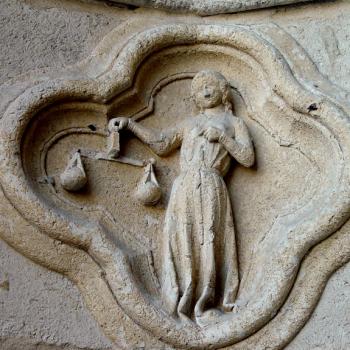
Christians are to follow Christ in the fact that they are to give of themselves to others, and to the world as a whole, in acts of loving service. “Let all that you do be done in love” (1Cor. 16:14 RSV). This is what it means to take up our cross, even as it was the reason why Jesus took up his cross. Because of the expectations which are placed upon us due to what love requires from us, we can say we are burdened by love; but yet, because it is love, fulfilling those burdens, fulfilling those expectations, should bring us much joy. When we go about giving a gift to someone we care about, we do not consider all that we go through to get it as a problem, rather, it helps elevate the joy which we receive when we give a gift the loved one not only appreciates, but desires from us. The harder it was to fulfill that desire, the more we share in their happiness and joy. Indeed, we might get more joy out of it than they do.
This, then, is what it should be like for us to fulfill our role as stewards of the earth. Though we might face great troubles as we try to ascertain the best way not only to preserve and protect the earth, but to lift it up by mediating God’s grace to it, we find in the end, greater joy, indeed, a greater sense of peace once we see the earth shining forth with the beauty which God intended it to have. It is indeed something greater than the momentary pleasure we get when we ignore our responsibility to the earth and rather seek to dominate and control it for our own selfish desires: we have seen the result of such sin as the earth becomes not only polluted, but outright harmful to us and those who live on it. The long-term effects of our neglect will create extreme suffering for the world, while the long term-effects of proper loving care for the earth will be able to create pleasant, indeed, glorious living environments which will feed the spirit even as it will be able to provide what is necessary to satisfy bodily needs.
Thus, as Robert Wennberg wrote, while we can talk about the burdens expected of us as we take care of the earth, and all that lives upon the earth, we need not think of them as burdensome; rather, the lack of such care will cause us such undue burdens while fulfilling our duty to the earth will only make us appreciate and experience the glory of God’s creation that much more:
We should note, finally, that burdens do not have to be burdensome. Although sacrifice and inconvenience may be required of us, surely there must be a sense of joy as we exercise faithful stewardship over a creation that contains so many wonders and beauties, a sense of privilege as we care for what God cares for. Indeed, when we come to recognize and fully appreciate the goodness of God’s creation, then the efforts we expend on its behalf and whatever sacrifices we make for it will not be offered grudgingly but willingly and gladly. [1]
Our self-centered, short-term desires might make us act out in ways which cause us and those around us great harm; when we focus purely on our inordinate desire, we will find it is insatiable; we will be like addicts, acting in ways which we think we will find pleasure, but getting less and less of it, until at last, we will have no sense of joy left in us. On the other hand, if love, instead of self-gratification, serves as the foundation for our actions and our treatment of all that is around us, we will find our addiction goes away. Not only will we truly be able to attain a sense of peaceful satisfaction with what we do, we will be able to see and experience the world in the light of that love, and see it is filled with and is capable of sharing with us, the glory and love of the Creator with us. For in the works of God, God is capable of being revealed. “On the glorious splendor of thy majesty, and on thy wondrous works, I will meditate” (Ps. 145:5 RSV). The uncreated energies of God shine in and through all creation, willing to lift it up and deify it; we close our eyes to that light when we turn towards the mere fulfillment of our petty desires. But if let God reveal himself to us through his works, through his creation, that transcendent light which shines within and through his creation will come to us and lift us up, indeed, giving us pleasures which last forever: “Thou dost show me the path of life; in thy presence there is fulness of joy, in thy right hand are pleasures for evermore” (Ps. 16:11 RSV).
In this regard, the reign of God, the kingdom of God, is revealed in Jesus, and through Jesus, through us. We are called to represent Christ to the world, to mediate his grace to the world, so that what is said about it in Scripture can be fulfilled. How can the heavens be glad and the earth rejoice if we fail our duty to them? How can they represent the glory of God if we darken them by our abusive ways? How can we be said to be partakers of the reign of God when the reign of God is shown, through David and others, to be one which includes the earth and all that is on it (instead of us alone)?
Let the heavens be glad, and let the earth rejoice, and let them say among the nations, “The LORD reigns!” Let the sea roar, and all that fills it, let the field exult, and everything in it! Then shall the trees of the wood sing for joy before the LORD, for he comes to judge the earth. O give thanks to the LORD, for he is good; for his steadfast love endures for ever! (1 Chron. 16:31-34 RSV).
Even the trees will sign with joy, David says, because of the grace of God reaching them, but how is that to be if we cut it off by cutting down and destroying the forests? As we have learned through science, our abuse of the trees, our destruction of forests, has helped cause climate change, threatening our own destruction as a result. What joy is there in that? What a great burden we will leave behind to those who come after us if they are the ones who will have to deal with the wanton destruction of the land, all because we have abdicated our position and stewards of the earth.
Truly, it should not be difficult for us to see our disregard for the earth, and all its inhabitants, will come at a steep price, and indeed, we risk losing our place on the earth itself in the same way Jesus showed unjust stewards will find themselves replaced. Jesus, when he ascended to heaven, went away, giving us the talents we need to look after and care for the earth and its inhabitants, to help make it greater, to beautify the earth and take care of its many creatures. Instead, we have squandered that talent and risk it being taken away from us and given to someone else. “For to every one who has will more be given, and he will have abundance; but from him who has not, even what he has will be taken away. And cast the worthless servant into the outer darkness; there men will weep and gnash their teeth” (Matt. 25:29-30 RSV). Those who have properly employed their talents, the grace given to them, and have done what they can to enlarge the presence of the kingdom of God on the earth, taking care of God’s wonderful creation, will see their own share of grace increasing, and with it their happiness and joy surpass any and all their expectations, even as the world around them will truly be lifted up and experience the end of its travails as the children of God will have fulfilled their role (cf. Rom. 8:21-22).
Love elevates, selfishness degrades. Love, though it is riddled with expectations, is filled with joy, making all that is done out of love seem as nothing. To those who watch us act out of such love, it might seem as we are riddled with cares, infinitely burdened by our duties, but to us, who act out of love, we are elevated by such love that we find joy in our duty, we find happiness and peace in its proper execution. Taking care of the earth, being stewards of the earth, might be our duty, it might be our responsibility, but we would not have it any other way.
[1] Robert N. Wennberg, God, Humans, and Animals (Grand Rapids, MI: William B. Eerdmans Publishing Company, 2003), 56.
Stay in touch! Like A Little Bit of Nothing on Facebook.
If you liked what you read, please consider sharing it with your friends and family!
















